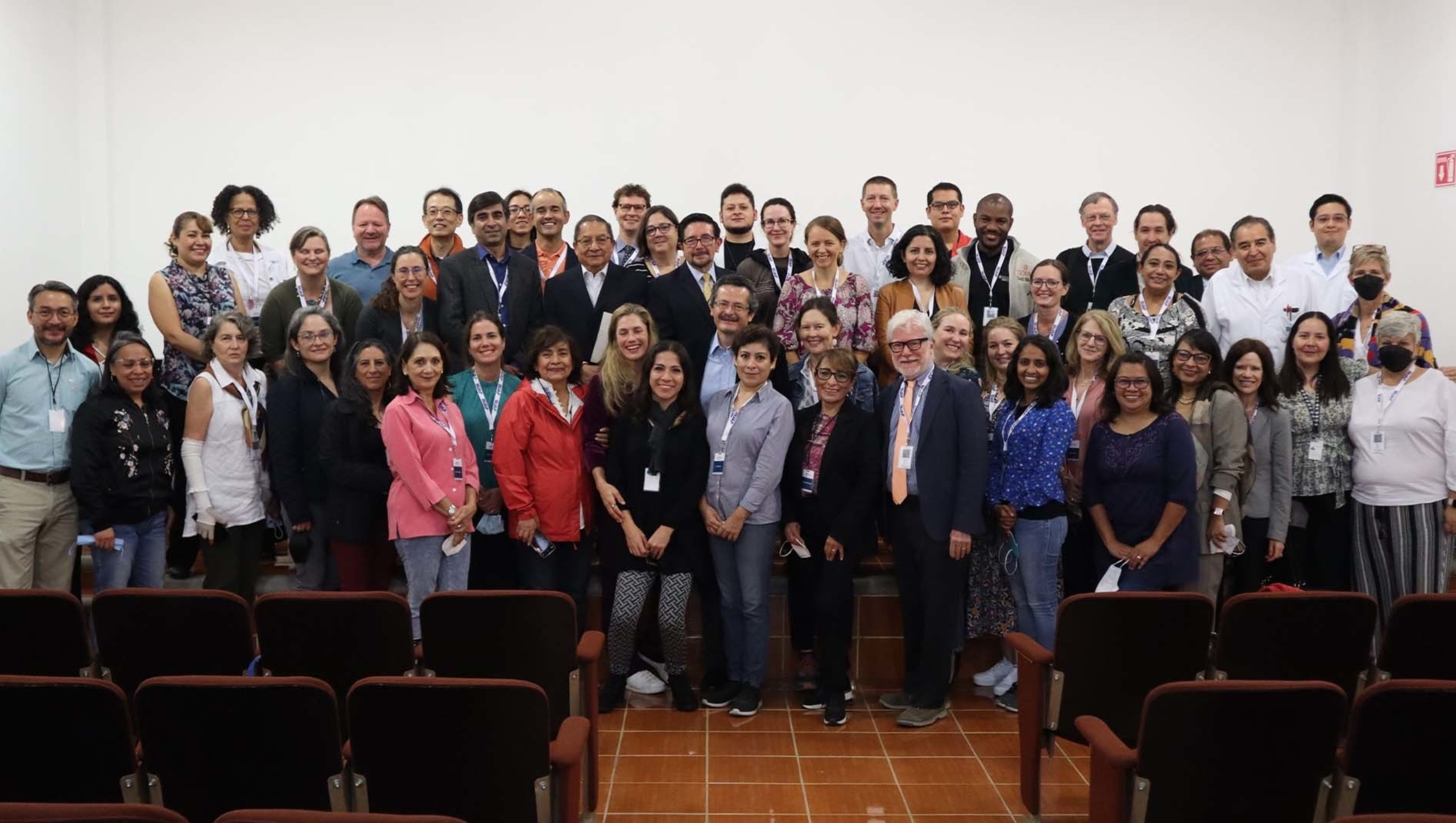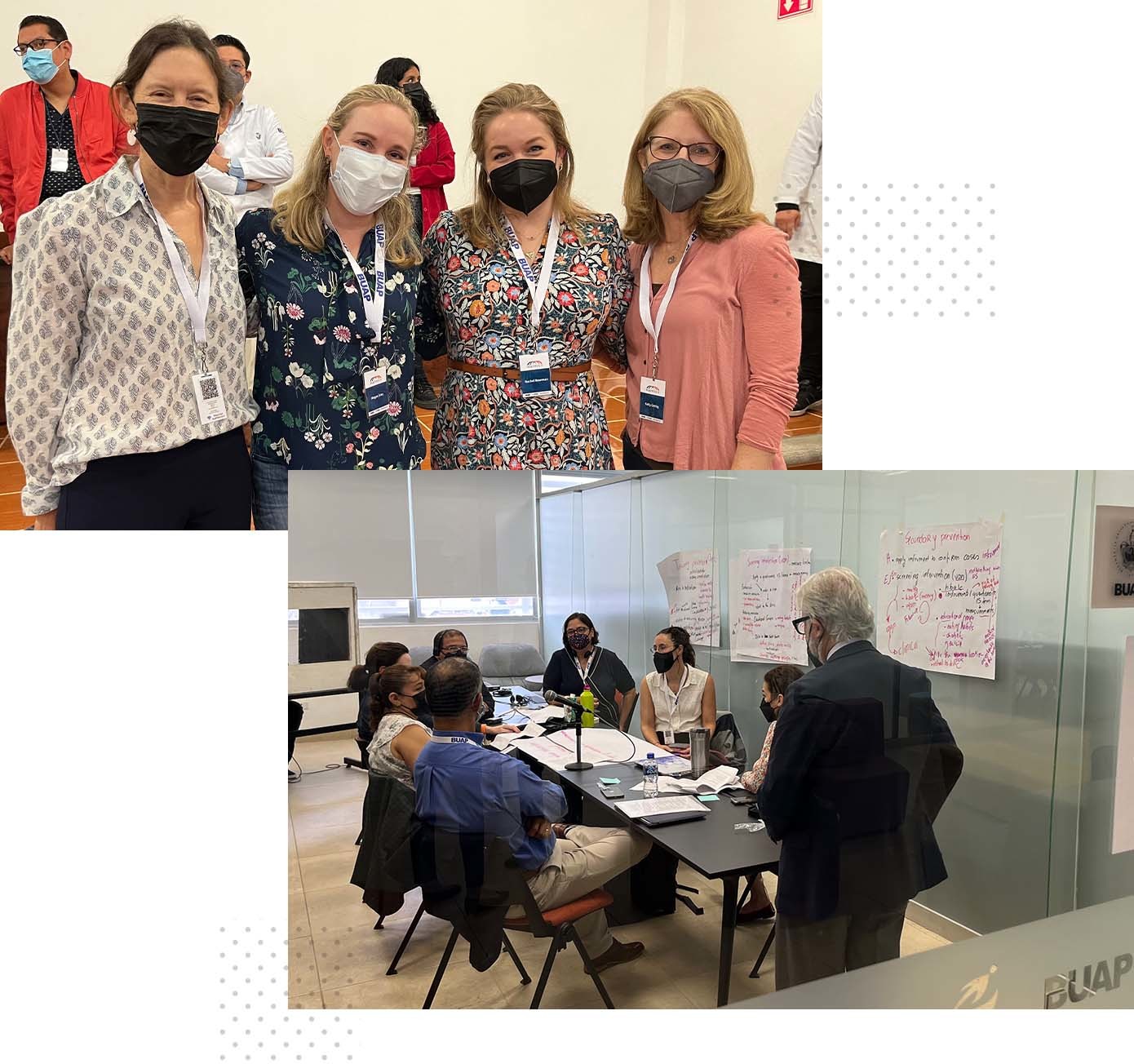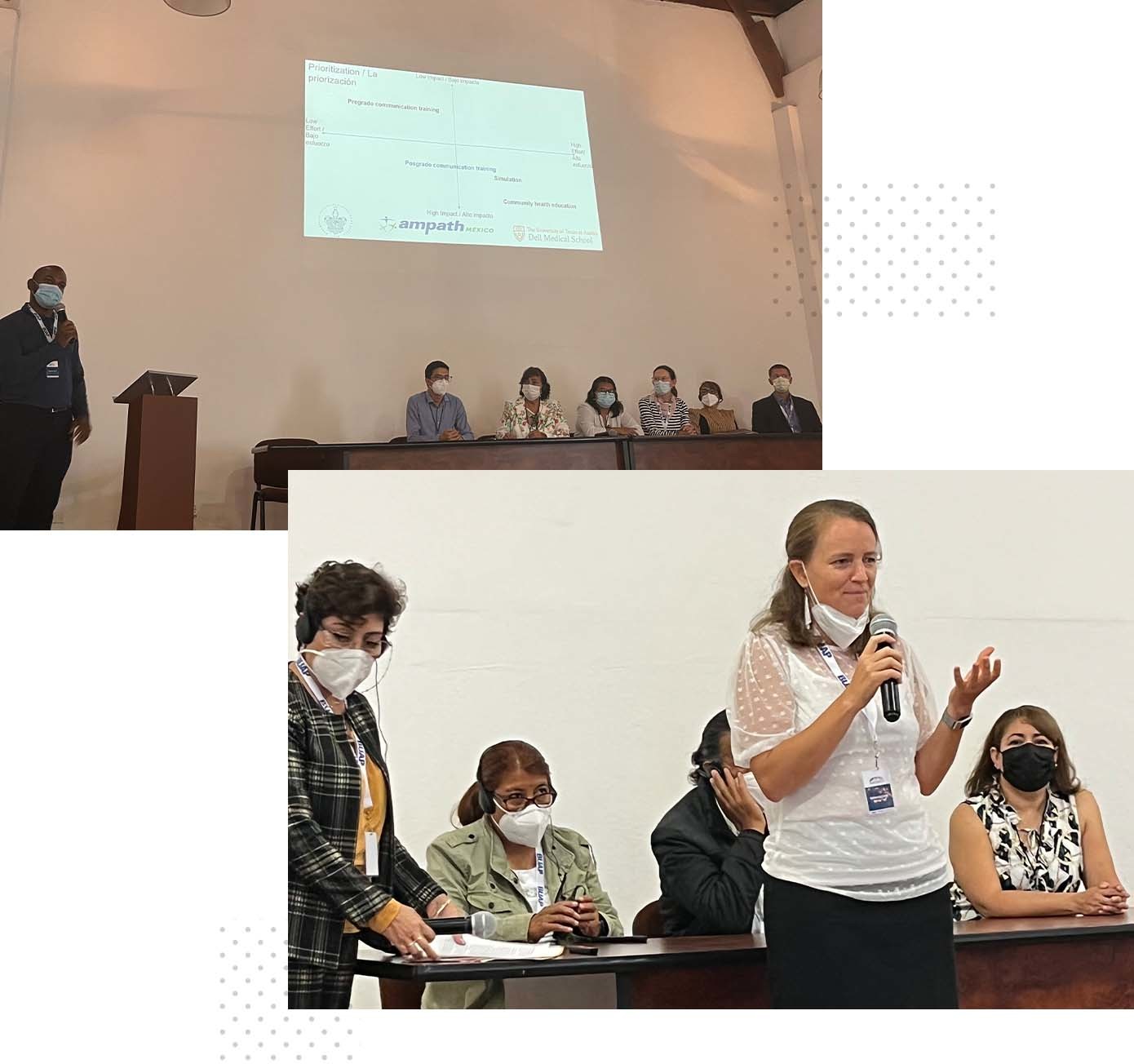Implementation research collaborations strengthen Dell Medical School’s health partnerships with Mexico.
Bridges connect the seemingly insurmountable, like chasms and gaps that otherwise don’t appear to hold a way forward. They can be figuratively built between languages, cultures, disciplines, countries and people. In August, in the busy halls of Puebla’s largest medical school, Dell Med and University of Texas at Austin faculty helped build bridges toward advancing health equity for lower-income communities in Mexico and Central Texas.
Becca Cook, M.D., population health faculty member and AMPATH México clinical team leader, closed out her welcome remarks to an international audience seated under the vaulted ceiling of the restored colonial-era church that is now the medical school’s auditorium at the Benemérita Universidad Autónoma de Puebla.
“You all won’t be in this big group and this big room listening to presentations for the rest of this event,” Cook said. “You’ll be working together with the background and expertise that you bring, bringing benefit to our communities and training programs.”

Puentes participants — including faculty, researchers and leadership from the Division of Global Health, Texas Global, BUAP, AMPATH Global and more — gather after concluding working-group presentations.
AMPATH, or the Academic Model Providing Access to Healthcare, is a model for academic health institutions and community partnerships that was developed over thirty years ago in Eldoret, Kenya, by Moi University and Indiana University. Its aims are to bilaterally advance health equity and address the root causes of health disparities for people worldwide via care, education and research, and it is now in a phase of multicountry adaptation with its consortium of universities, an effort known as AMPATH Global.
Convening Teams to Address Global Health Challenges
The joint partners of AMPATH México — Dell Med, led by the Department of Population Health’s Division of Global Health, BUAP’s Facultad de Medicina and Mexico’s prestigious Instituto Nacional de Salud Pública — convened in Puebla for the third iteration of a UT- and Mexico-focused summit known as Puentes, or bridges. This year’s three-day event — hosted at BUAP for over seventy people and titled “Building Collaborative Implementation Research Teams” — centered around bringing together six thematic working groups of clinical faculty and researchers across institutions, which formed over the past spring to address health priorities and challenges in three pilot communities in Puebla. Held for the first time in Mexico, this Puentes event came ten months after the medical schools at UT and BUAP signed a formal agreement to bring AMPATH México to life.
“This is an exciting time in the evolution of the AMPATH México partnership,” said Tim Mercer, M.D., MPH, chief of the Division of Global Health at Dell Med. “For several years now, we’ve been working to develop our relationships and plan the structure and the goals of this partnership. But today we move into implementation phase, with teams of faculty members poised to roll up their sleeves and get to work.”

With 25 total participants each from UT and BUAP, the interdisciplinary groups included representatives from Instituto Nacional de Salud Pública and worked both in English and Spanish with interpreters. Groups focused on clinical topics such as diabetes, nutrition, maternal health and mental health, as well as broader topics such as health education, evaluation, informatics and data management.
The groups heard presentations on Puebla communities and their backgrounds and needs identified in previous assessments, completed by UT and BUAP teams working on projects for the President’s Award for Global Learning. They learned more about the AMPATH pillars of care, education and research, as demonstrated in Kenya, and of cross-country funding to advance their work between the U.S. and Mexico. Groups then huddled together for hours to develop their approach to addressing challenges in strategic and impactful ways. On the second day, an evaluation group built another kind of bridge by placing a representative in each of the other groups to help inform their own.
These community-driven, collaboratively designed and self-evaluative approaches to addressing health challenges — in an effort to learn and build for the benefit of low-resourced communities in Puebla and Central Texas — are squarely in line with Dell Med’s focus on health equity. Building bridges allows everyone to access a better way, and Puentes contributes directly to the school’s work to educate leaders who transform health care, accelerate research for the improvement of health and strengthen community health as a globally applicable model.
Strengthening Health Partnerships Abroad
Dell Med has also found a surprisingly like-minded partner in BUAP’s Facultad de Medicina. “This effort aligns perfectly to the development program of our rector,” said BUAP medical school director Luis Guillermo Vazquez de Lara Cisneros. “The capacity to internationalize ourselves, to establish productive collaborations and overall to have an effect in the population. Obviously, institutions are required in these collaborations, but the products should be directly related to our populations.”
On the final day, teams sat united before an audience of local stakeholders and visiting representatives from Dell Med, BUAP, Instituto Nacional de Salud Pública, AMPATH Global and Indiana University, and Eli Lilly and Company, a longtime partner of AMPATH that awarded a $2.8 million grant over four years to launch AMPATH México. Also present was the health attaché from the U.S. Embassy in Mexico, as well as the new director of the Mexico Global Gateway at UT’s Texas Global, partner of the Division of Global Health.

One by one, the teams presented their group’s focus, project proposals and timelines post-Puentes. Ideas included everything from conducting community diabetes screenings, creating a locally sourced, nutrition-focused education cookbook and developing pilot research tools to identifying barriers and improvements for sexual and reproductive health services, analyzing data samples on health care delivery, and delivering trainings on nutrition, mental health and community leadership to medical students, residents and nurses.
Leaders from the key community partner organization Fundación Comunitaria de Puebla listened closely and responded at the closing. “It’s quite ambitious,” said Patricia Vargas Espinosa, community representative and one of the Fundación’s directors. “But I would like for this to not stay just on paper — as research — and be enough. But to overall go toward each one of the families in the communities for long-term changes in improving health. So in that sense, please continue your focus on these projects. Making changes, in addition to research, to achieve these changes for those families.”
Each group’s next steps included securing seed funding for their respective projects and further engaging community stakeholders in the pilot sites. For example, recent medical school graduates in Mexico are assigned to complete a year of social service as interns, or pasantes. Some are placed within academic medical institutions, while most are posted in underserved communities, making up a significant portion of the health care workforce. Pasantes engage in direct primary care as well as health promotion and other community outreach.
By including pasantes as partners and stakeholders in these upcoming projects, AMPATH México — and Dell Med — will directly contribute to strengthening global health systems. “We have to find the structure to continue with what we have begun here,” said Ricardo Ainslie, Ph.D., director of education and research for AMPATH Mexico and director of UT’s LLILAS Benson Mexico Center, where the Puentes events began. “The groups have worked so intensely and it’s extremely impressive. We have three different institutions from two countries, and it’s exciting what we’ve achieved in just these two days.”